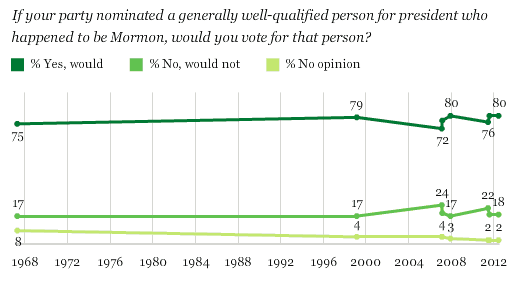The answer seems to be yes, unfortunately, but the results are somewhat encouraging.
Eighteen percent of Americans say they would not vote for a well-qualified presidential candidate who happens to be a Mormon, virtually the same as the 17% who held this attitude in 1967...
The exact percentage of Americans who resist the idea of voting for a Mormon has varied slightly over the eight times Gallup has asked the question, typically when a Mormon was running for president, including George Romney (1968 campaign), Orrin Hatch (2000 campaign), and Mitt Romney (2008 and 2012 campaigns). The percentage opposed to a Mormon president has averaged 19% since 1967 -- from a low of 17% at several points to a high of 24% in 2007. The current 18% is down from 22% a year ago.
Gallup originally asked the question in April 1967, after Mitt Romney's father, Michigan Gov. George Romney, announced the formation of an exploratory committee for the 1968 Republican nomination. At that point, George Romney was one of the two top contenders for the GOP nomination, along with the eventual winner, Richard Nixon.
Now, some 45 years later, George Romney's son Mitt will be the Republican nominee -- and the pattern of resistance to his Mormon religion has essentially not changed.
One would hope, of course, that the percentage of Americans who oppose Mitt Romney’s candidacy simply because he’s Mormon would be zero percent. But as this is not a perfect world (nor a perfect country, for that matter), at least a supermajority of Americans can look past their own fears and bigotries when evaluating presidential candidates. It’s also worth mentioning, too, that Republicans -- not Democrats -- are more open to the idea of voting for a LDS candidate in 2012; indeed, nine out of 10 Republican adults polled in the survey said they would. (Only 72 percent of Democrats, by contrast, would support a well-qualified Mormon for president if nominated this election cycle). Nevertheless, considering roughly 40 percent of Americans do not know Romney belongs to the LDS Church, it remains to be seen just how much his religious background will impact voters on Election Day.

























Join the conversation as a VIP Member